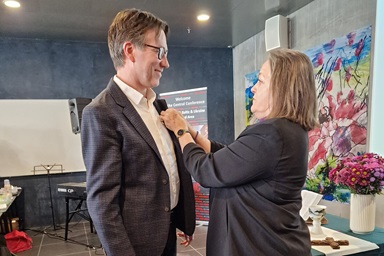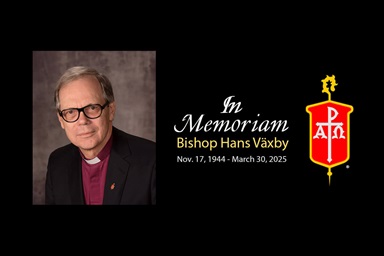The latest — and longest lasting — partial ceasefire in Syria was showing signs of collapse this week, but not before the country’s besieged civilians were granted a reprieve.
That is the message David Wildman, an executive with the United Methodist Board of Global Ministries, heard during a visit with religious colleagues in neighboring Lebanon in early April. “In Aleppo (Syria), some aid was getting in and people were relieved,” he said.
Syria has experienced 80 small ceasefires in various locations over the last five years of conflict, Wildman noted. Those ceasefires are important because even a break in fighting for several weeks can make a difference.
“A ceasefire doesn’t make the news, but, in fact, it makes the difference for people’s lives in that village,” he explained. Ceasefires also help stop the “very destabilizing” flood of weapons, he added.
Humanitarian access, however, remains a big issue. “There probably are a half million people who are besieged in hard-to-reach areas right now in Syria,” Wildman said.
Thomas Kemper, top executive of the Board of Global Ministries and the Rev. Olav Fykse Tveit, head of the World Council of Churches, were among the 102 leaders of faith or aid groups signing on to a joint appeal — initiated by the Norwegian Refugee Council and UNICEF — for humanitarian access in Syria. The groups made the appeal March 15, on the fifth anniversary of the start of the conflict there.
“Humanitarian access and freedom of movement of civilians in Syria has to be sustained,” reads the appeal. “It has to be unconditional. And it should include access to all people in need by whatever routes necessary.”
How you can help
The United Methodist Committee on Relief and Board of Global Ministries are addressing the global refugee and migration contexts guided by four principles:
Acknowledging the right to stay and flourish in one's country of origin;
Allowing safe passage for those with no viable alternative but to leave;
Welcoming and belonging, a process wherein migrants, refugees, and receiving communities work together to meet the needs of new arrivals;
Supporting those who return to help them reintegrate with dignity into their home countries after deportation.
Advance No. 3022144, “Addressing the global refugee and migration crisis,” has an annual fundraising goal of $2.25 million. To donate
Rights of refugees
The Syrian crisis is an example of the how the church can and should respond to the different situations in which the internally displaced or refugees find themselves, Wildman said.
“Beyond Bethlehem,” an Advent video project initiated by Ginghamsburg United Methodist Church in Ohio and Global Ministries, illustrated those stages.
By advocating for ceasefires, humanitarian aid and other international peacemaking interventions, the church can support a civilian’s “right to stay.” But when civilians feel forced to flee, they need “safe humanitarian passage.” Often, they seek refuge in other countries in their immediate region.
Lebanon has the largest number of refugees per capita in the world. Those seeking the needed response of “welcoming and resettling” do not fall into a stereotyped category, as Wildman and Dan Bracken, senior media producer at Ginghamsburg Church, found when they visited Syrian newcomers at a long-established Palestinian refugee camp in a Beirut suburb.
“Not everyone there was a banker, but, also, not everyone was destitute completely,” Wildman explained. “But they were all stuck and wanting to go home.”
While the Lebanese “have been quite gracious” with the new influx of refugees, he said, some tensions inevitably arise with the local community over jobs and resources. “We’re nervous about what would happen if 10,000 Syrians come to the United States, and they have one and a half million refugees or more,” he pointed out.
Some non-governmental organizations, including church groups, who support refugees in Middle Eastern countries are nervous that funding priorities will shift to refugees in Europe, Wildman said. Most European church-based aid organizations, he explained, rely on government-backed funds.
U.N. agencies also may have to cut the amount of food distributed to refugees because government donors are not meeting appeal targets, Wildman said. He encouraged United Methodists to advocate for full funding to “put the money where the need is for programs that already are there.”
Border closings and new tensions
The recent European Union agreement for mass deportations of migrants arriving in Europe from Turkey after March 20 has sparked clashes with refugees trapped at camps in Greece. Pope Francis is scheduled to visit the Greek island of Lesbos on April 16.
Wildman calls the deportation plan “a violation of rights.” The question now is how to support giving refugees choices that allow them to be a part of the decision-making process about their future, he said.
“What churches can do is at least affirm and support political leaders when they’ve taken a moral stand and welcome the stranger,” he said.
Wildman also questioned the validity of a decision by the European Union to label those from Afghanistan already in Europe as “economic” refugees eligible for deportation.
Those from Afghanistan also fear for their safety, said Wildman, who has made many trips to that country over the years. He pointed out that “2015 was the most violent year in Afghanistan since the U.S. invasion that led to the toppling of the Taliban in 2001.”
Bloom is a United Methodist News Service multimedia reporter based in New York. Follow her at https://twitter.com/umcscribe or contact her at (646) 369-3759 or [email protected]
Like what you're reading? Support the ministry of UM News! Your support ensures the latest denominational news, dynamic stories and informative articles will continue to connect our global community. Make a tax-deductible donation at ResourceUMC.org/GiveUMCom.




